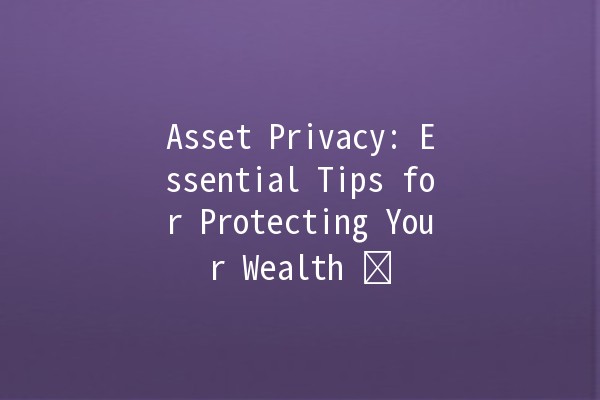




In today’s digital world, individuals and businesses face increasing threats to their asset privacy. As financial transactions and sensitive data move online, it becomes crucial for us to safeguard our wealth and personal information from prying eyes and potential threats. This article will provide practical advice and actionable tips on how you can enhance your asset privacy, ensuring your wealth remains secure.
Asset privacy refers to the protection of your financial assets and personal information. In a world where data breaches and cyberattacks are commonplace, maintaining privacy over your assets requires proactive measures. This encompasses a wide range of activities, from securing financial accounts to safeguarding personal data.

Explanation: Encryption is the process of converting information into a code to prevent unauthorized access. This is particularly important for sensitive financial data.
Application Example: Use VPNs (Virtual Private Networks) to encrypt your internet connection when accessing banking services. Additionally, employ encrypted storage solutions like VeraCrypt for your important documents.
Explanation: Regular monitoring of financial accounts can help detect suspicious activity early on. Being vigilant allows for immediate action if a breach is detected.
Application Example: Set up alerts for all transactions, especially large ones, on your bank accounts and credit cards. Use tools like Mint or Personal Capital to track expenses and notifications for unusual activities.
Explanation: A strong password can act as the first line of defense against unauthorized access to your financial accounts.
Application Example: Create complex passwords that are at least 12 characters long and include a mix of letters, numbers, and symbols. Use a password manager like LastPass or 1Password to store and generate unique passwords for different accounts.
Explanation: Identity theft protection services can monitor your personal information and alert you to any suspicious activity linked to your identity.
Application Example: Services like LifeLock or IdentityGuard offer monitoring of your personal information across the web and can assist in fraud recovery if your identity is compromised.
Explanation: Keeping software up to date is crucial in closing security gaps that could be exploited by attackers.
Application Example: Enable automatic updates for your operating system, antivirus programs, and applications. Regularly patching known vulnerabilities can minimize the risk of potential cyber threats.
To start securing your assets, focus on creating strong passwords, enabling twofactor authentication, and utilizing encryption for sensitive files. Regularly monitor your accounts for irregular activities and consider employing an identity theft protection service.
If there are unfamiliar transactions in your financial statements, bills for unfamiliar accounts show up, or you receive calls about debts you do not owe, these could indicate identity theft. Immediate investigation is encouraged, including credit report checks.
Using public WiFi can be risky, especially for sensitive transactions. It is advisable to use a VPN to encrypt your data when accessing financial platforms over public networks. This provides an additional layer of security.
Businesses can ensure asset privacy by implementing data encryption, restricting access to sensitive information, and training employees about security practices. Additionally, regular audits and compliance checks can help maintain customer trust and data safety.
If you find yourself a victim of identity theft, report the incident to your bank immediately to freeze accounts and prevent further losses. Also, file a report with local law enforcement and consider placing a fraud alert on your credit report.
Yes, failing to protect customer data can lead to significant legal ramifications, including fines and lawsuits. Many jurisdictions have data protection laws that require businesses to maintain a certain standard of data security.
Government regulations play a crucial role in setting standards for data protection. Adhering to regulations such as the GDPR or CCPA is essential for both businesses and individuals to ensure that personal data is handled respectfully and securely.
By utilizing these tips and understanding the importance of asset privacy, individuals and businesses can take proactive steps to secure their wealth against various threats. Whether it's through technology, monitoring, or education, there are numerous strategies to enhance the privacy of your assets effectively.